Dragnet Girl (1933)
Kinuyo Tanaka, Joji Oka, Sumiko Mizukubo, and Mitsui Hideo. Written by Tadao Ikeda and Yasujiro Ozu. Directed by Yasujiro Ozu.
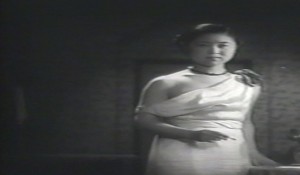 In Yasujiro Ozu’s Dragnet Girl, Tokiko (Kinuyo Tanaka) works as a typist in an office full of typists, but she is favored by the boss’s son, who gives her expensive jewelry and longs to spend time with her away from the job. He seems unaware that she is the girlfriend of Jyoji (Joji Oka), a former boxer and now a small-time yakuza boss. Tokiko enjoys the benefits of being a gangster’s moll, seeming to bask in the jealous looks by other girls at the preferred dance club.
In Yasujiro Ozu’s Dragnet Girl, Tokiko (Kinuyo Tanaka) works as a typist in an office full of typists, but she is favored by the boss’s son, who gives her expensive jewelry and longs to spend time with her away from the job. He seems unaware that she is the girlfriend of Jyoji (Joji Oka), a former boxer and now a small-time yakuza boss. Tokiko enjoys the benefits of being a gangster’s moll, seeming to bask in the jealous looks by other girls at the preferred dance club.
Against his better judgment, Jyoji accepts a young, directionless Hiroshi (Mitsui Hideo) into his organization, but very soon after, he is approached, bravely yet humbly, by Hiroshi’s sister Kazuko (Sumiko Mizukubo), who begs Jyoji with Bambi eyes and soft curls, to release Hiroshi from his service. She is convinced that despite his slacker ways, her brother can right his life if only Jyoji will turn him away. We’ve seen enough of Hiroshi, as has Jyoji, to think Kazuko is blinded by affection for her goof-off sibling, but something about Kazuko hits a soft spot in Jyoji, something that doesn’t escape Tokiko’s notice. And Tokiko didn’t get where she is by letting things just happen around her.
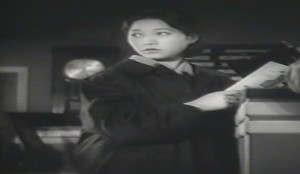 Story-wise, Dragnet Girl isn’t bad, but it spends too much time on setting up the story and not enough letting it play out in front of us. We get to know the individual characters fairly well; then when Jyoji, Kazuko, and Tokiko encounter each other in varying combinations, they say and do things that we’re just supposed to accept with nothing to explain or support them. One character pulls a gun, then touches another character’s cheek softly and says, “I like you.” Why? How?
Story-wise, Dragnet Girl isn’t bad, but it spends too much time on setting up the story and not enough letting it play out in front of us. We get to know the individual characters fairly well; then when Jyoji, Kazuko, and Tokiko encounter each other in varying combinations, they say and do things that we’re just supposed to accept with nothing to explain or support them. One character pulls a gun, then touches another character’s cheek softly and says, “I like you.” Why? How?
It’s a pretty good-looking film. Although it predates the established early examples of film noir, it clearly is the visual relative of the noir influencers, with casted shadows and harsh, flashing lights providing moody heft. I don’t know if the vignetting (present almost throughout) is the result of the film’s aging, the limitations of the available technology, or a decision by the director, but it goes a bit too far. It somehow feels kind of oppressive.
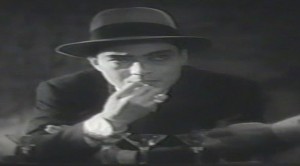 I’m not holding this against the film, but it is worth noting that this is maybe the least Japanese-feeling Japanese film I’ve ever seen. Ozu goes out of his way to make this feel completely like a Western movie. You know those signs you see in American pool halls that say, “No smoking over the table” and “No masse shooting?” Apparently, pool halls in Japan had the same signage in the 1930s, and in English, too. There isn’t a stitch of Japanese-influenced clothing to be seen anywhere, and with the exception of a few eaves on buildings, the architecture is completely non-reminiscent of Japanese cities presented in other films of the time.
I’m not holding this against the film, but it is worth noting that this is maybe the least Japanese-feeling Japanese film I’ve ever seen. Ozu goes out of his way to make this feel completely like a Western movie. You know those signs you see in American pool halls that say, “No smoking over the table” and “No masse shooting?” Apparently, pool halls in Japan had the same signage in the 1930s, and in English, too. There isn’t a stitch of Japanese-influenced clothing to be seen anywhere, and with the exception of a few eaves on buildings, the architecture is completely non-reminiscent of Japanese cities presented in other films of the time.
Despite these mild shortcomings, Dragnet Girl is mostly satisfying. There’s a sweetness to Tokiko’s assertiveness in the final act, and there’s a kind of tension in the final scenes that plays out nicely, propelled by Tokiko’s convictions and gumption. Definitely worth checking out for fans of early gangster pictures and for enthusiasts of Japanese cinema.
The Song of the Fishermen (1934)
Wang Ren Mei, Han Lan Gen. Directed by Chusheng Cai.
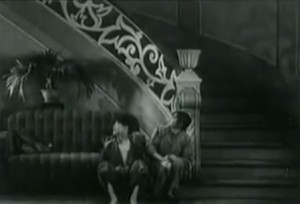 The noble plight of the poor, filial piety, perseverance in the face of repeated tragedy, and the toll wealthy families take on everyone else: the familiar themes of Chinese cinema are here in The Song of the Fishermen, with a sympathetic rich man’s son and a mentally handicapped brother to make things a little different. Set first against a small fishing village and then a large city, the story of Little Cat (Wang Ren Mei) and Little Monkey (HanLan Gen) unfolds like many of the familiar stories.
The noble plight of the poor, filial piety, perseverance in the face of repeated tragedy, and the toll wealthy families take on everyone else: the familiar themes of Chinese cinema are here in The Song of the Fishermen, with a sympathetic rich man’s son and a mentally handicapped brother to make things a little different. Set first against a small fishing village and then a large city, the story of Little Cat (Wang Ren Mei) and Little Monkey (HanLan Gen) unfolds like many of the familiar stories.
Yet there is an element here that I found engaging and new. Throughout this silent film from 1934, there is a tiny thread of hope that things are just one or two lucky turns away from getting better for everyone involved. A rich man’s son is nursed by a fisherman’s wife, who often suckles the young master rather than attending to the needs of her own infant son, so loyal is this hard-working woman to the house of her employment.
The kids grow up together, the young master chastising Little Cat and Little Monkey for repeatedly calling him “master” and often begging Little Cat to sing “The Song of the Fishermen” for him. But as years pass, the wealthy young man is educated in a distant city and the others experience the travails of life as a poor family struggling to get by.
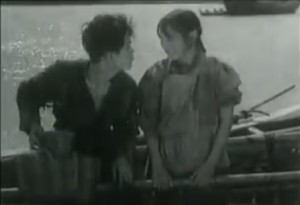 You know that extended section of The Good Earth where famine forces Wang Lung to pack up his family and head to the city? There a section of this movie that’s like that, and our main characters find a few different ways to scrape together some change, always a moment away from the next tragedy, yet the viewer clings to the hope that somehow, their connection to the rich family might somehow be their salvation.
You know that extended section of The Good Earth where famine forces Wang Lung to pack up his family and head to the city? There a section of this movie that’s like that, and our main characters find a few different ways to scrape together some change, always a moment away from the next tragedy, yet the viewer clings to the hope that somehow, their connection to the rich family might somehow be their salvation.
The Song of the Fishermen played in Shangai theaters for eighty-four straight days, a record at the time, and is the first Chinese film to win a prize at an international film festival (Moscow Film Festival in 1935). While it suffers from a certain amount of overacting, the solid portrayal of Little Cat by Wang Ren Mei keeps it mostly believable, and if the strong, indefatigable women characters in The Good Earth and The Story of Qiu Jiu appeal to you, you may want to check this one out.
Both films: 6/10, on the upper end of average.
Dragnet Girl and The Song of the Fishermen are among eighteen films screening at the San Francisco Silent Film Festival, from May 29 to June 1, 2014.
- Excited
- Fascinated
- Amused
- Disgusted
- Sad
- Angry








